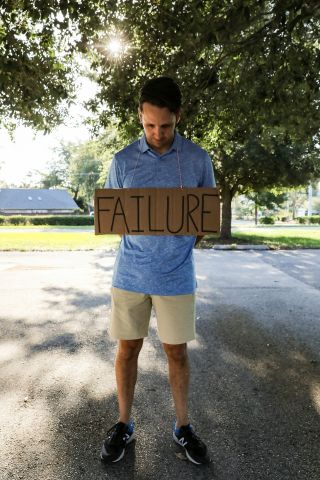Imposter Syndrome
Stop Letting Self-Doubt Rob You
Research has shown that self-doubt is a debilitating reality experienced by most.
Posted April 26, 2024 Reviewed by Ray Parker
Key points
- Imposter syndrome robs us of confidence and energy towards constructive action.
- Experts, geniuses, award-winners admit to having self-doubt and imposter syndrome.
- Aplomb is a sense of self-confidence, poise and assurance which is most powerful in challenging times.
- We can increase our sense of aplomb by doubting self-doubt to engage with work and ideas we care about.

Recently, Nathan led a disheartening meeting. He stood on a small stage at the front of an amphitheater, looking out at Ph.D. students—brilliant people with some of the highest test scores, accepted to elite institutions, and working with top scholars in their respective fields. Almost every single one admitted they were racked by self-doubt: Were they good enough to be there? Could they succeed? Was everyone smarter than them? Faster than them? Better than them? If you have ever felt similar self-doubt, then you are in good company. Most of us do.
Nathan's heart broke for the students, both because they weren't aware of their vast capability but also because he knew their self-doubt was robbing them. It isn’t leading them to get up early and engage an idea with the kind of enthusiasm that sparks more ideas; it's not increasing their long-term retention; it's definitely not creating the kind of passion that drives a project forward through the inevitable barriers. Instead, their self-doubt is wasting their energy via the anxiety, discouragement, and procrastination it brings with it. Perhaps some would argue that their self-doubt leads them to work longer and harder, but research clearly establishes that working longer does not mean better work1.
Based on the research in our book, The Upside of Uncertainty2, he tried to explain to the assembled students that the way out of this trap is to start by doubting their self-doubt. For starters, research on imposter syndrome3 suggests that at least 70% of people feel the imposter syndrome4. That is, they are not as good as everyone else, and they are just faking it. It could be more, especially in high-pressure situations.
Moreover, when you start to study the great achievers, innovators, and change-makers, as we did in The Upside of Uncertainty, you realize that even the “greats” feel immense self-doubt. When John Steinbeck wrote one of the most iconic American novels, which many argue led to his Nobel prize, he kept a journal now published under the title Working Days5. In this journal, his self-doubt runs rampant. He tells himself he isn’t a writer, he’s just faking it, he doesn’t have the skill, and on and on in a heartbreaking rollercoaster. Yet because he persisted, he captured one of the most emphatic and impactful portraits of a great American tragedy. Examples abound of others who, in their more vulnerable moments, revealed that they, too, doubted themselves. So, it’s completely normal that you should too.
Interestingly, there is a high probability that our self-doubt is a byproduct of inaccurate comparisons with others, what psychologists have labeled relative deprivation.6 As an illustration of these effects, writer Malcolm Gladwell observed7 that at Hayward College, half of the students with top SAT scores chose challenging science, technology, engineering, and mathematics (STEM) degrees, while those in the lower third of SAT scores must have concluded they were not as smart as their peers, and so chose easier majors. But when Gladwell looked at Harvard University, he found the exact same distribution. Even though students in the bottom third of SAT scores at Harvard have better SAT scores than the top students at Hayward, they tend to compare themselves locally to their peers, not globally to their real situation, and end up concluding they aren’t smart enough. In this case, self-doubt is a complete illusion.
So, start by doubting your self-doubt, recognizing that it’s holding you back from doing the things—studying, reading, practicing, editing, pitching, trying, or whatever it is—that would help you learn and improve. From that more aware mindset, you can begin to build “aplomb” from the old French for self-confidence, poise, or assurance, especially in times of difficulty. And then, entertain the possibility that you are better than you think. The great philosopher Friedrich Nietzsche argued8 that one of the great challenges of human life is that we see through a set of lenses we inherit, created by our forebearers and ourselves, by which we judge the world. One of those lenses we may need to drop is underscored by contemporary philosopher Christopher Hitchens9, who argued that a lens working against us in the Western world is the belief that somehow we are not moral creatures. Rather we are inherently selfish and fallen creatures that would misbehave in the absence of controlling laws and precepts. Hitchens questions this assumption, like many others such as David Sloan Wilson10, asking what if instead we are inherently moral in a life-affirming way?
Who are you really, without these discouraging and intimidating filters? We all can increase our aplomb because we all have an authentic self with interests, talents, and skills that our families, communities, and workplaces need. What might you do today if you could put down the weight of your self-doubt? We usually fail a bit before we succeed, so let’s jump in with both feet and get started. Let them haul us off the stage trying rather than never having tried at all.
References
1) https://papers.ssrn.com/sol3/papers.cfm?abstract_id=2149325
2) https://www.theupsideofuncertainty.com/
3) https://psycnet.apa.org/record/1994-17499-001
4) https://thementalhealthtoolbox.com/wp-content/uploads/2022/03/Sakulku.2…
5) https://www.goodreads.com/en/book/show/141148
6) https://journals.sagepub.com/doi/abs/10.1177/1088868311430825
7) https://www.youtube.com/watch?v=7J-wCHDJYmo
8) https://www.goodreads.com/book/show/94578.The_Gay_Science
9) https://www.goodreads.com/book/show/43369.God_Is_Not_Great


